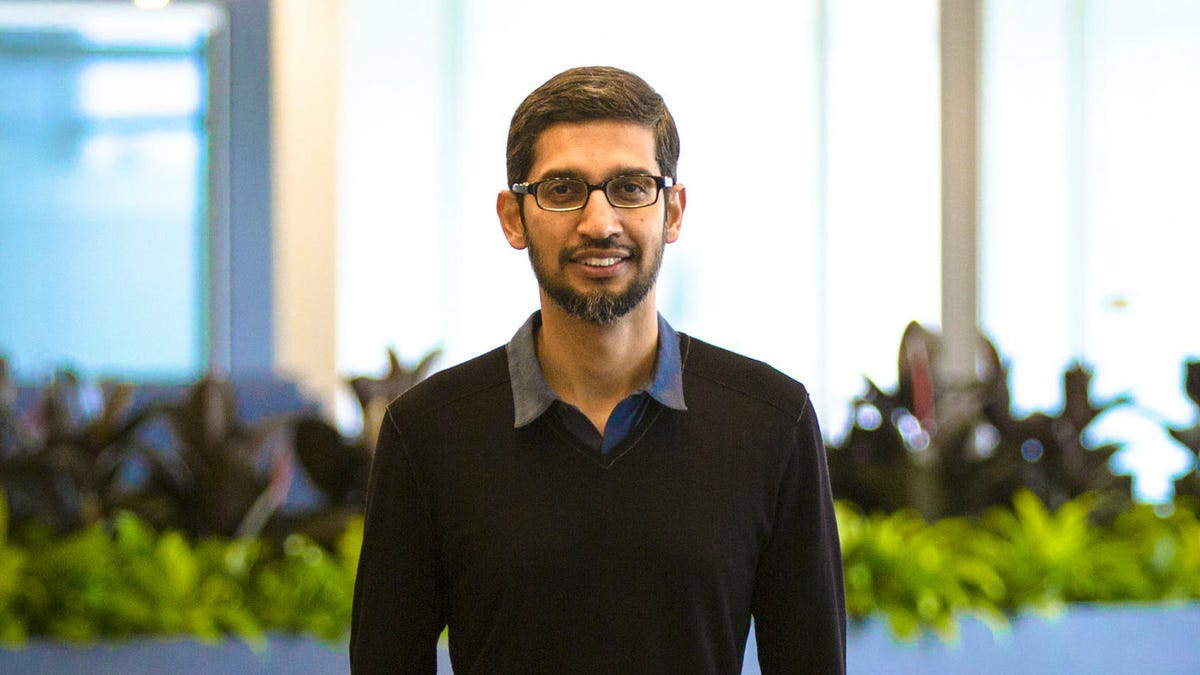Google CEO: Our AI is better because we've been doing it longer
Sundar Pichai also talks about the possibility of a Google phone, the company's presence in China and a certain request he has for Apple.
If the battle between rival digital assistants can be summed up by the NBA championships, then Google's take would be the Golden State Warriors.
That's assuming, of course, the record-setting Warriors beat the Cleveland Cavaliers to defend their NBA title.
It's the analogy used by Google CEO Sundar Pichai, who characterized the competition as more friendly than bloody. "This is not like 'Game of Thrones,'" he said Wednesday at Recode's Code conference in Ranchos Palos Verdes, California.
Artificial intelligence is already a hot topic at the conference, and it's a big part of Google's future. Pichai devoted much of his keynote address at last month's Google I/O developer event to the strides the online search giant has made in building a better, smarter digital assistant. The company later this year plans to sell Google Home, a speaker that features the assistant, which is similar to Amazon's Echo and its Alexa digital software.
As to why Google's assistant is better: "We've been doing it longer," Pichai said. The company has handled more queries than anyone, he said, a nod to the countless searches Google handles every day.
While he acknowledged that it's still early days, he made it clear that Google is ahead of the pack. The big advantage, according to Pichai, is the company's ability to handle context, which is tough for computers. For instance, you can ask how many sheep there are in New Zealand and get one answer. But if you follow up by asking who the prime minister is, most computers won't understand the link to the previous question. Pichai said his digital assistant will be smart enough to understand that line of questioning and give you the right answer.
"Building true conversational understanding and having a dialogue is where we plan to differentiate," he said.
Here's what else Pichai had to say:
On privacy
Pichai is sensitive to privacy concerns that might arise with a digital assistant that's always listening. He stressed that users will be able to control their settings and turn off the listening function when they choose to.
"We give users choice," he said. "Over time, we can get smarter at giving users sophisticated privacy controls."
But he noted he wants to save every conversation with his daughter.
On a true Google phone
Google partners with phone manufacturers such as LG, Huawei and others to create its Nexus phones, which serve as the flagship device for a specific version of its Android mobile software.
When asked whether Google will build its own phone, Pichai said the company plans to continue working with manufacturers rather than go it alone. But he did note that Google plans to be more active with its input on software innovations and designs for future Nexus phones.
Google has dabbled with hardware, including its Chromecast TV streaming stick and its upcoming Google Home speaker.
On China
Pichai said he wants to go back to China in a big way, but said he wants to be "thoughtful" about it.
"It depends on the situation, but we're open to it," he said.
Google shut down its search engine in China in 2010 after it was a victim of a cyberattack by the country, and it hasn't had a significant presence there since then. While Chinese manufacturers use Android to power their devices, services such as Google Play aren't available.
Pichai, however, noted that Google supports advertisers and developers who work on Android in China. "I've always thought Google was for everyone, including China," he said.
On Apple
Pichai said he's open to working with Apple to make their message apps work between Android and iOS. While Google's message apps can be found on an iPhone, Apple services such as Facetime and iMessage don't work on Android devices.
"I'm making an ask here to the extent that the big companies can work together," he said
On the EU's charges
Google is in the crosshairs of the European Union, which has hit the company with antitrust charges of using the dominance of Android to squeeze out rivals.
"We are engaging thoughtfully with them," Pichai said. "We are very popular and users use us a lot, and this is the context in which these questions are being asked."




